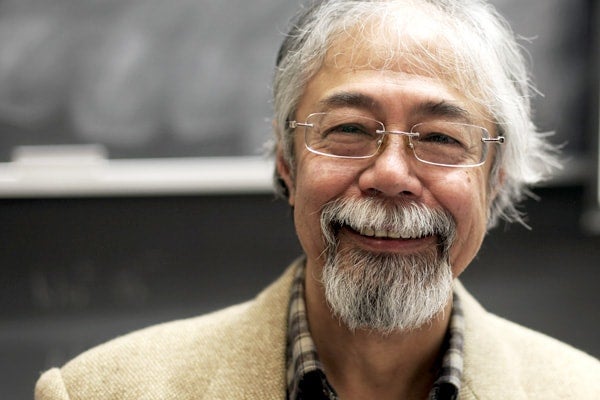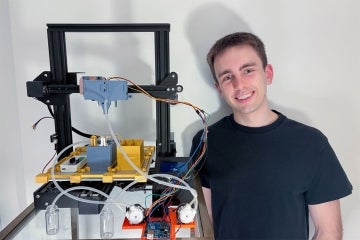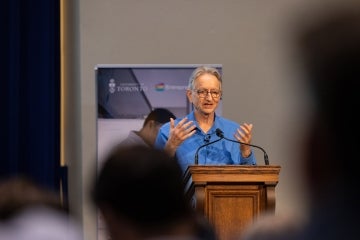
Creating a buzz at U of T about entrepreneurship
Published: January 23, 2012
“I’m not going to try to tell you how to do business in the Middle Kingdom (China),” retired businessman Paul Ip told a crowd of budding entrepreneurs during a recent Engineering Entrepreneurship Series lecture at the University of Toronto. “I started up and ran two different businesses in China. I’ll tell you my story and let you draw your own conclusions.”
Ip’s words were music to the ears of Professor Jonathan Rose of electrical and computer engineering. One of his colleagues encouraged Rose to create an entrepreneurship lecture series for students after the latter spent time working in the computer industry in Silicon Valley. Rose quickly found that people there talked constantly about starting companies.
“I’m trying to help inspire a culture of entrepreneurship here,” he said. “My goal is to have students hear stories of entrepreneurship. If they hear enough of those stories and learn about how the entrepreneurs navigated the issues, they’ll come to believe they can do it, too.”
Ip, a native of Hong Kong who now lives in Brampton, had interesting stories to share. He never attended university; instead, he learned on the job. While working for Bayer, a conglomerate based in Germany, and AVEBE. a Dutch Farmers' Co-op, he was twice given the task of opening a factory in China: the first to create dye stuffs [pigments to dye clothing, etc.]; the second to produce potato starch. He succeeded in both projects, but it was the obstacles along the way that made the process interesting.
“Building a factory in China is not something you do overnight,” he said, enumerating the things he needed to make the first factory project a reality, including finding a partner and a site and securing government approval.
He found a likely partner, manager of a state-owned factory, and soon learned that there were numerous approvals required to proceed. To the Chinese government, appearances were as important as the financial details.
“For a partnership, the whole deal must be politically and socially correct,” said Ip. “In order for it not to look like the factory was sold to foreigners, the manager couldn’t be too soft with his terms.”
Ip also needed to get the union to co-operate and was involved in negotiating all kinds of details, including the number of toilets the factory would have.
“Two stumbling blocks almost killed the deal,” he said. “We were asked to provide a dormitory for the workers and to build a canteen in the factory.”
His German superiors were taken aback by these types of demands, believing the money could be used better to invest in the factory, but Ip persevered. His team promised to employ only local workers and to transport them to and from their homes, and they built a large dining hall for the workers, as well as a smaller restaurant where management could host guests.
As fast as the obstacles popped up, Ip found a way to knock them down.
“I’m of the belief that if you’re afraid, don’t build in a foreign country,” he said.
Ip concluded the talk with a question and answer period, then headed off for an informal meal with students who had registered to join him.
“His views about working with people being not so black and white were very interesting,” said alumnus Kenny Ho, an electrical engineer working on starting his own business.
Added Rose, “You can’t be in business today without thinking about China.”
Rose said the emphasis of the series is on storytelling, not on teaching lessons about entrepreneurship, since it seems the be the model that works best. The lectures are open to everyone across the university and registration for dinner with the speaker is on a first-come, first-served basis.
Visit the electrical and computer engineering website for information about upcoming speakers.



